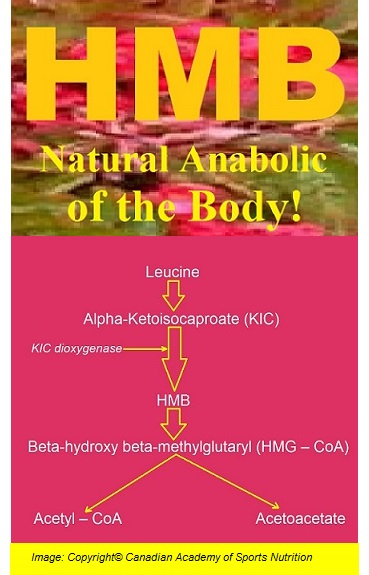HMB is the metabolite of the essential amino acid leucine, one of the BCAAs. It has recently  gained popularity among athletes because of its anabolic activity, which means it promotes protein synthesis and gaining lean muscle mass.
gained popularity among athletes because of its anabolic activity, which means it promotes protein synthesis and gaining lean muscle mass.
 gained popularity among athletes because of its anabolic activity, which means it promotes protein synthesis and gaining lean muscle mass.
gained popularity among athletes because of its anabolic activity, which means it promotes protein synthesis and gaining lean muscle mass.Leucine breaks down into alpha-ketoisocaproate (KIC), which later converts into HMB in the presence of the enzyme KIC dioxygenase. After being produced in the body, HMB converts into HMG – CoA in the mitochondria. Then HMG – CoA breaks down into acetyl-CoA and acetoacetate.

Natural Sources:
Normally, HMB is produced in the body. Also, small amounts of HMB can be found in grapefruit, catfish, and alfalfa.Athletic Benefits of HMB:
Because of the ability of HMB in retaining nitrogen and building muscle, it may affect athletic performance. Potential athletic benefits of HMB are:- Increases muscle mass.
- Helps recuperate faster from intense exercise.

- Supports recovery.
- May help prevent from rhabdomyolysis when combined with L – carnitine. See “Post – Exercise Rhabdomyolysis” under the section of “Athletic Disorders”.
- Shows significant ergogenic effect when combined with creatine monohydrate.
- Reduces protein break down during intense exercise (anti-catabolic activity).
- May protect from overtraining syndrome.
Non – Athletic Benefits of HMB:
- High cholesterol.
- HIV support (when combined with glutamine and arginine).
- Catabolic states:
- Severe burns.
- Major surgeries.
- Cancers.
Dosage:
HMB is taken 3000 – 4000 mg daily in divided doses. The best time to take HMB is approximately 30 minutes before exercise or competition and immediately after exercise within anabolic window (see “Nutrition After Exercise“).
